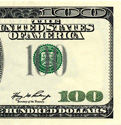Letter to the editor: Bush era, Republican tax cuts expand deficit

300 dpi Anita Langemach color illustration of one-hundred-dollar bill with Benjamin Franklin wearing baseball cap and blowing whistle. The Gazette (Colorado Springs) 2009<p> club coaches illustration benjamin franklin coach referee whistle blower money hundred dollar bill; krtussports; u.s. us united states; consultants; krtbusiness business; krtfinancialservice financial services; krtnamer north america; krtusbusiness; krtnational national; krtsports sports; krt; mctillustration; FIN; SPO; 04000000; 04006003; 15000000; 2009; krt2009 gt contributor coddington langemach mct2009 mct
December 9, 2010
E-mail [email protected].
When voters casted their votes on the first Tuesday of November, they were “angry.” On all the major television networks, radio stations, Internet outlets and news syndicates, we learned about the growing angst of the electorate.
Pundits and talking heads alike declared the donkeys (Democrats) as an endangered species and paved the way for the leading elephants (Republicans). The polls demonstrated that voters were angry with the terrible economy, more specifically the looming debt. GOP candidates used this political capital and ran campaigns about “bringing back fiscal responsibility to Washington.” In essence, as portrayed by the pundits, the electorate fired the Democrats for not addressing the escalating debt and replaced them with Republicans to solve the issue.
The deficit, the debt, the deficit, the debt; that is all we heard about leading up to the 2010 midterm elections. What we didn’t hear about was the largest contributor to the deficit: the 2001 Bush Era tax cuts.
Some of Obama’s recent legislation (TARP, financial bailouts and health care reform) do contribute to the amounting deficit. However, those pale in comparison to the tax cuts.
For example, extending the tax cuts for the middle class (households earning less than $250,000 annually) over the next two years will add an estimated $3 trillion to the deficit. Additionally, the extensions made to the upper class (households earning more than $250,000) will add an estimated $1 trillion to the deficit. In sum, an extension of the Bush Era tax cuts for the next two years will add $4 trillion to the expanding deficit.
In 2001, when Bush passed the tax cuts, America enjoyed a surplus, not a deficit. Therefore, the tax cuts seemed like a good idea for the GOP at the time. That is until America became involved with two wars, Afghanistan and Iraq. Wars cost money. In general, when America has gone to war it has raised taxes, save Vietnam. The only way to pay for a war is to raise taxes. During World War II the highest federal income tax bracket was 91 percent, almost triple what it is today. Thus, if you made $100,000 during World War II you really only took home $9,000. By no means is Afghanistan or Iraq equivalent to World War II.
But my point is simple: You can’t go to war and lower taxes without expecting the deficit to grow.
Since Republicans campaigned on “fiscal responsibility,” they need to adhere to their promise. How is advocating for tax cuts that will add a substantial amount to the deficit “fiscal responsibility?” For almost a decade Americans enjoyed lower taxes at the expanse of two wars. It is now time to pay for these wars if America ever wants to achieve “fiscal responsibility.”
Case Fedor
Political science senior























































































































































